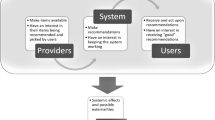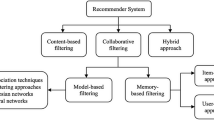Abstract
Recommender systems combine ideas from information retrieval, user modelling, and artificial intelligence to focus on the provision of more intelligent and proactive information services. As such, recommender systems play an important role when it comes to assisting the user during both routine and specialised information retrieval tasks. Like any good assistant it is important that users can trust in the ability of a recommender system to respond with timely and relevant suggestions. In this paper, we will look at a collaborative recommendation system operating in the domain of Web search. We will show how explicit models of trust can help to inform more reliable recommendations that translate into more relevant search results. Moreover, we demonstrate how the availability of this trust-model facilitates important interface enhancements that provide a means to declare the provenance of result recommendations in a way that will allow searchers to evaluate their likely relevance based on the reputation and trustworthiness of the recommendation partners behind these suggestions.
Similar content being viewed by others
References
Balfe E, Smyth B (2004) Case-based collaborative Web search. In: Proceedings of the 7th European conference on cased based reasoning. pp 489–503
Bilgic M, Mooney RJ (2005) Explaining recommendations: satisfaction vs. promotion. In: Proceedings of beyond personalization 2005: a workshop on the next stage of recommender systems research at the 2005 international conference on intelligent user interfaces. San Diego, CA. http://www.cs.umd.edu/mbilgic/publications/explainingrecs.pdf
Boydell O, Smyth B, Gurrin C, Smeaton AF (2005) A study of selection noise in collaborative Web search. In: Proceedings of the 19th international joint conference on artificial intelligence, IJCAI-05. Edinburgh, Scotland, pp 1595–1597
Carter J and Ghorbani AA (2004). Towards a formalization of value-centric trust in agent societies. Int J Web Intelligence and Agent Systems 2(3): 167–184
Doyle D, Cunningham P, Bridge DG, Rahman Y (2004) Explanation oriented retrieval. In: Funk P, González-Calero PA (eds) ECCBR: Lecture notes in computer science, vol 3155 Springer, pp 157–168
Froehlich TJ (1994). Relevance reconsidered—towards an agenda for the 21st century: introduction to special topic issue on relevance research. J Am Soc Inf Sci 45(3): 124–134
Guha R, Kumar R, Raghaven P, Tomkins A (2004) Propagation of trust and distrust. In: Proceedings of WWW 04. ACM, pp 403–412
Gyöngyi Z, Garcia-Molina H, Pedersen J (2004) Combating Web spam with trustrank. In: Proceedings of the 30th international conference on very large databases. Morgan Kaufmann, pp 576–587
Joachims T, Freitag D, Mitchell TM (1997) Web watcher: a tour guide for the World Wide Web. In: IJCAI (1). pp 770–777
Mayer RC, Davis JH and Schoorman F (1995). An integrative model of organizational trust. Acad Manage Rev 20(3): 709–734
Massa P, Avesani P (2004) Trust-aware collaborative filtering for recommender systems. In: CoopIS/DOA/ODBASE (1). pp 492–508
McCarthy K, Reilly J, McGinty L, Smyth B (2004) On the dynamic generation of compound critiques in conversational recommender systems. In: Bra PD (ed) Proceedings of the third international conference on adaptive hypermedia and web-based systems (AH-04). Springer. Eindhoven, The Netherlands, pp 176–184
McSherry D (2004) Incremental relaxation of unsuccessful queries. In: Calero PAG, Funk P (eds) Proceedings of the european conference on case-based reasoning (ECCBR-04). Springer. Madrid, Spain, pp 331–345
Metaxas PT, DeStefano J (2005) Web spam, propaganda and trust. In: First international workshop on adversarial information retrieval on the Web. http://airweb.cse.lehigh.edu/2005/metaxas.pdf
O’Donovan J, Smyth B (2005a) Eliciting trust values from recommendation errors. In: Russell I, Markov Z (eds) FLAIRS Conference. AAAI Press, pp 289–294
O’Donovan J, Smyth B (2005b) Trust in recommender systems. In: IUI ’05: Proceedings of the 10th international conference on intelligent user interfaces. ACM Press, New York, NY, USA, pp 167–174
O’Mahony MP, Hurley NJ, Kushmerick N and Silvestre GCM (2004). Collaborative recommendation: a robustness analysis. ACM Transactions on Internet Technol—Special issue mach learn internet 4(4): 344–377
Reilly J, McCarthy K, McGinty L, Smyth B (2004) Dynamic critiquing. In: Calero PAG, Funk P (eds) Proceedings of the European conference on case-based reasoning (ECCBR-04). Springer. Madrid, Spain, pp 763–777
Resnick P, Iacovou N, Suchak M, Bergstrom P, Riedl J (1994) Grouplens: an open architecture for collaborative filtering of netnews. In: Proceedings of the 1994 conference on computer supported collaborative work. pp 175–186
Resnick P, Kuwabara K, Zeckhauser R and Friedman E (2000). Reputation systems. Commun ACM 43(12): 45–48
Resnick P, Zeckhauser R (2001) Trust among strangers in internet transactions: empirical analysis of eBay’s reputation system. Technical report, University of Michigan. http://www.si.umich.edu/presnick/papers/ebayNBER/
Richardson M, Agrawal R, Domingos P (2003) Trust management for the semantic Web. In: International semantic Web conference. pp 351–368
Schafer JB, Konstan JA and Riedl J (2001). E-commerce recommendation applications. Data Mining Knowledge Discovery 5(1/2): 115–153
Smyth B, Balfe E, Briggs P, Coyle M, Freyne J (2003) Collaborative Web search. In: Proceedings of the 18th international joint conference on artificial intelligence, IJCAI-03. Morgan Kaufmann. Acapulco, Mexico, pp 1417–1419
Smyth B, Balfe E, Freyne J, Briggs P, Coyle M and Boydell O (2004a). Exploiting query repetition and regularity in an adaptive community-based Web search engine. User Model User-Adapt Interact: J Personal Res 14(5): 383–423
Smyth B, McGinty L, Reilly J, McCarthy K (2004b) Compound critiques feedback for conversational recommender systems. In: Zhong N, Tirri H, Yao Y, Zhou L, Liu J, Cercone N (eds) IEEE/WIC/ACM International conference on Web intelligence (WI’04). IEEE Press. Beijing, China, pp. 145–151
Yahoo!: Accessed: 11/11/2005, My Web 2.0. http://myweb2.search.yahoo.com
Author information
Authors and Affiliations
Corresponding author
Rights and permissions
About this article
Cite this article
Briggs, P., Smyth, B. On the role of trust in collaborative Web search. Artif Intell Rev 25, 97–117 (2006). https://doi.org/10.1007/s10462-007-9025-6
Published:
Issue Date:
DOI: https://doi.org/10.1007/s10462-007-9025-6




